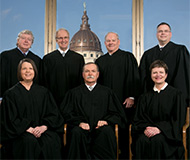4/11/2017
Kansas Supreme Court Strikes Down Driveway TaxesDespite what Mission, Kansas calls it, the transportation user fee is a prohibited tax.

Driveway taxes are no longer legal in Kansas following Friday's state Supreme Court ruling. The "transportation user fee" has become popular revenue-raising tool for municipal politicians nationwide, boosting property tax bills for all homes and businesses with driveway access to city streets.
In Oregon, for example, dozens of cities adopted the fee as a way of bypassing Measure 5 limits on property taxes. City leaders find the fee easier to implement than increasing sales taxes or other steps that typically requires voter approval.
The city of Mission's tax was based on an estimated average number of vehicle trips generated by properties within city limits. If the city believes a certain property generates more trips (for example, it has a large parking lot), it is charged a higher fee. Residential homes pay $72 per year, while businesses can pay up to $16,160 per year. The tax is based entirely on city estimates -- no actual traffic counts are used to calculate how much businesses must pay. The fee enabled the city to boast of having the "second lowest property tax rate in Johnson County" while still collecting more money.
The Heartland Apartment Association sued Mission shortly after the tax was implemented. The association argued that the driveway tax illegal and full refunds were due to everyone who paid it. State law explicitly prohibits municipalities from imposing new taxes "in the nature of an excise," so the case turned on whether the transportation user fee was a disguised tax or an actual user fee.
"In determining whether an exaction is a tax or fee, the primary considerations are: Who is paying? Who is benefiting? and What will the revenue be used for?" Justice Carol A. Beier explained in Friday's ruling. "A tax is a forced contribution to pay for the government's general services, that is, services that benefit the members of the public at large, regardless of whether any particular person has paid the tax... An exaction is a fee when the benefits are not enjoyed by the public at large."
Because the transportation user fee was not used for specific improvements or as compensation for administering a particular service, the high court saw it as a tax in all respects.
"To the extent that those who pay the transportation user fee benefit from the governmental service the transportation user fee funds, the benefit is of a general nature and shared with the public at large," Justice Beier wrote.
The justices sent the case back to the trial court to resolve the remaining legal issues. A copy of the ruling is available in a 200k PDF file at the source link below.


